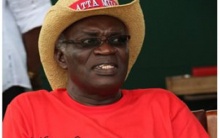
The Ghana National Petroleum Corporation (GNPC) has debunked accusations levelled against it by policy think-tank, IMANI Ghana, to the effect that the corporation has been misleading the public regarding the jubilee oil production prospects.
GNPC says “IMANI’s analysis of Jubilee Phase 1A project cost is informed by wrong information and wrong extrapolation from inadequate information” and says “they could have spared themselves and the public some anxiety by simply asking GNPC for the correct information and challenging us to explain before going public. Our doors are always open for constructive discussion about the oil and gas industry in Ghana.”
IMANI in an article released earlier this month said their independent verification suggests that cost of Jubilee Phase 1A have been inflated by over 100%. The Policy think-tank suggested that the GNPC’s Jubilee Field operations smacks of incompetence.
But GNPC has flayed IMANI’s argument, stating that the assertion is wrong.
It said contrary to IMANI’s pessimistic assessment of the operations of the corporation, the Jubilee field operations have been competent and that “Jubilee has delivered industry-leading operational and safety performance.”
Jubilee Field Expenditure
GNPC said in the statement that, IMANI Ghana’s allegation that the original Jubilee development cost are abnormally high and are premised on a position of ignorance, describing the analysis as “superficial and simply unscientific.”
[RELATED STORY - Alert: IMANI casts doubts on Ghana’s gas figures]
“Development costs are not the same across time or place… The Jubilee Field was developed between 2009 and 2011 when oil prices were at an all-time high consistently exceeding US$70 per barrel and often above $100 per barrel for prolonged periods. Rig rates during this period ranged from US$440,000 – US$650,000/day with aggregate daily drilling costs (“spread rates”) around US$1 million per day. By contrast, Angola’s Girasol Field development commenced in July 1998 and Brazil’s Roncador was discovered in October 1996 with production commencing in 1999. In this period, oil prices averaged about US$20 per barrel and rig day-rates were about US$200,000 per day,” the statement said.
It said IMANI’s claims that the cost of drilling a well in water depths of less than 4,000 ft is US$220,000 per day is simply wrong.
“IMANI’s figure will at best cover only the ‘bare boat’ cost of a drilling rig. It will not cover the ‘spread rate’ which includes all the facilities, supplies and services without which a drilling rig is not of much use.”
According to GNPC, the cost of drilling a rig includes mud logging, coring, cementing, Remote Operating Vehicles, support vessels, anchor-handling vessels, among others.
Distorted Figures?
The statement goes on to state that “IMANI’s assertion that Jubilee wells are located in water depths of 3609 ft is non-factual and indeed baseless. 3609 ft is simply the depth at which the FPSO Kwame Nkrumah is moored. The Jubilee Phase 1A wells are spread over several kilometers not just clustered around the FPSO. Water depths range from 3,600 ft to 5100 ft.”
GNPC further discredited the US$122.5 million for the Technip subsea facilities contract figure put out by IMANI, stating that the figure covers only project management, engineering, fabrication and installation of one new flexible riser, two rigid flow lines, and 11 spools/jumpers, as well as the installation of two manifolds and 5 kilometres of umbilicals.
“It does not cover other necessary subsea components including Subsea Christmas trees, Pipeline End Termination (PLET), Connectors, Suction Piles, Umbilical Termination Assemblies (UTAs) and Multi-phase flow meters. All these add substantial cost to the project CAPEX,” the statement said. [RELATED STORY - IMANI Alert: Worrying Developments in Ghana’s Oil Sector] The GNPC explained that the information being peddled about the First Oil date of the Jubilee Phase 1A project is untenable because First Oil will commence with only 5 out of 8 wells completed. It said the other 3 will be completed in 2013.
The GNPC further added that it is inaccurate to accuse the GNPC of not being accountable to the government, emphasizing that the corporation is in compliance with Ghana’s statutory reporting and accountability obligations.
The statement said the “GNPC is audited by the Auditor-General every year and our audited accounts are submitted to all relevant Government Agencies including the Ghana Revenue Authority (GRA) in accordance with Article 187 of the Constitution and Section 12 of the Ghana National Petroleum Law, 1983, (PNDC Law 64).”
The Corporation said in view of the possible misrepresentation of its activities, it does well to participate in a number of activities in order to throw more light on its operations. It is also calling on those who want the concrete figures behind the facts of the Jubilee Field to seek same at the appropriate quarters. [CLICK HERE TO READ THE FULL STATEMENT FROM GNPC]